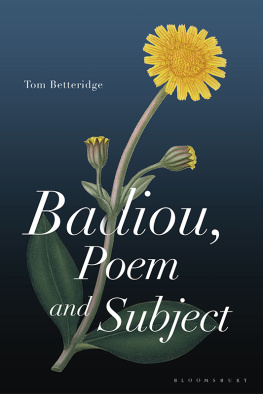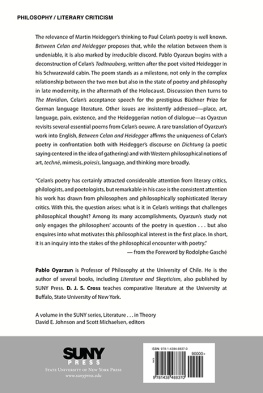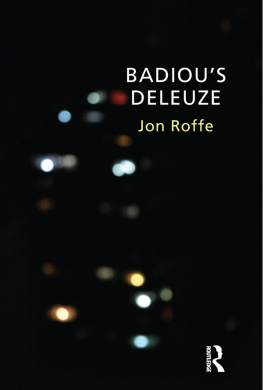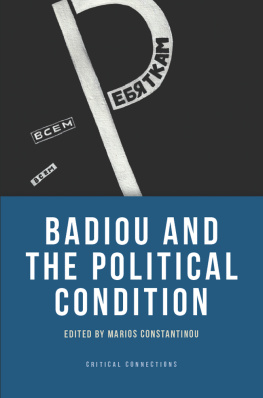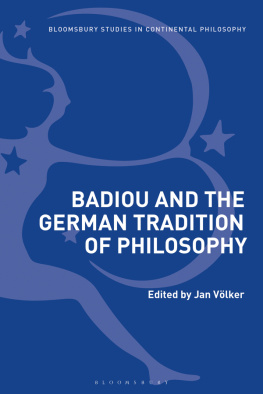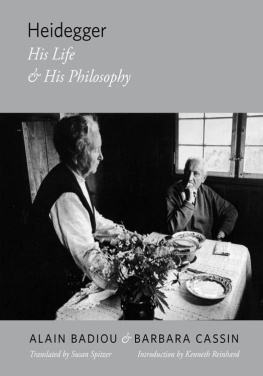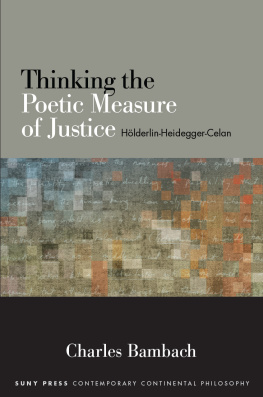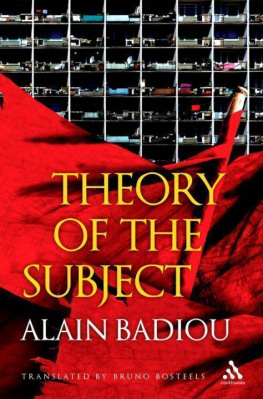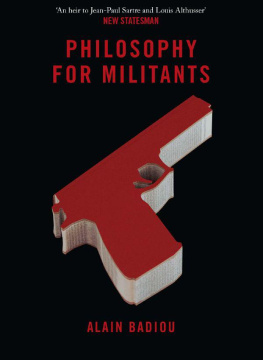Badiou, Poem and Subject
Badiou, Poem and Subject
Tom Betteridge

Also available from Bloomsbury
Badiou and His Interlocutors: Lectures, Interviews and Responses, ed. A.J. Bartlett and Justin Clemens
Badiou and Indifferent Being: A Critical Introduction to Being and Event, William Watkin
Badiou and the German Tradition of Philosophy, ed. Jan Vlker
The Pornographic Age, Alain Badiou, trans. A.J. Bartlett and Justin Clemens
For Emilia Weber, with love.
This book is based on the doctoral research I undertook in the School of Critical Studies at the University of Glasgow between 2010 and 2015. Without my supervisors, Vassiliki Kolocotroni and Paddy Lyons, none of that work would have been possible, and I am immeasurably grateful to them for their guidance and inspiration, and for their solidarity. My warmest thanks to my examiners Jane Goldman and Nina Power, whose generous and critical comments and suggestions were a constant source of encouragement and reassurance in revising this work for publication. A very early version of the first part of Chapter 1 was first published in 2012 as Silence Being Thought: Badiou, Heidegger, Celan, in Evental Aesthetics, 1 (2): 1748. Chapter 3 was published in 2016 as Alain Badious Anabasis: Rereading Paul Celan against Heidegger, in Textual Practice, 30 (1): 4568. My thanks to the editors. Many thanks to Carcanet Press Ltd too for their permission to reproduce extracts from Michael Hamburgers translations of Paul Celan. All efforts have been made to trace copyright holders. In the event of errors or omissions, please notify the publisher in writing of any corrections that will need to be incorporated in future editions of this book.
I would also like to thank Ellen Dillon and Andrew Rubens for their invaluable help with knotty questions of translation, Lila Matsumoto and Georgina Brckner for all of the Celan-talk and Dominic Smith for recommending Badious The Century in 2007 this is all your fault. Thank you as well to the anonymous readers of both my initial book proposal and the resulting manuscript for their belief in the project and for their insightful suggestions, and to the editors at Bloomsbury, Liza Thompson, Frankie Mace and Lucy Russell, for their patience, advice and support throughout the process of bringing this work to publication.
My sincere gratitude to my friends and colleagues over the years for their innumerable kindnesses, inspiration and generosity, and to my parents, Chris and John, and my sister, Sally, for their unwavering support throughout my studies. This book is for Emilia Weber, with love.
All works by Alain Badiou
| AP | The Age of Poets: And Other Writings on Twentieth-Century Poetry and Prose |
| BE | Being and Event |
| BOE | Briefings on Existence: A Short Treatise on Transitory Ontology |
| C | Conditions |
| E | Ethics: An Essay on the Understanding of Evil |
| FP | The Adventure of French Philosophy |
| HI | Handbook of Inaesthetics |
| IT | Infinite Thought: Truth and the Return to Philosophy |
| OB | On Beckett |
| M | Metapolitics |
| MP | Manifesto for Philosophy |
| ISLP | In Search of Lost Prose |
| LW | Logics of Worlds: Being and Event, II |
| PL | In Praise of Love |
| PM | Philosophy for Militants |
| PP | Pocket Pantheon |
| TC | The Century |
| TW | Theoretical Writings |
| W | Five Lessons on Wagner |
| WA | Wittgensteins Antiphilosophy |
Recalling one of his early encounters with Richard Wagners operas, Alain Badiou offers an arresting image of cultural exchange between France and Germany in the wake of the Second World War:
As early as the summer of 1952, my father, as the Oberbrgermeister of Toulouse, was invited to the New Bayreuth under the direction of Wieland Wagner. We travelled through a defeated, dreary Germany that was still in ruins. The sight of these big cities reduced to piles of rubble insidiously prepared us for the disasters of the Ring or the derelictions of Tannhuser that we would be seeing on the stage. I was enthralled by Wielands quasi-abstract productions, which were aimed at doing away with all the Germanic particularism that for a time had associated Wagner with the horrors of Nazism.
Badious father, Raymond Badiou, was a mathematics professor and the mayor of Toulouse from 1944 to 1958, the citys first following its liberation by the French Resistance in 1944. By naming his father the Oberbrgermeister of Toulouse, Badiou prefaces his account of Wieland Wagners productions with wariness towards this German invitation that would presume to lay claim to French territory after its liberation. Nonetheless, Badious father, as both French leftist mayor of Toulouse and German Oberbrgermeister, here is made to stand as something of a figure of cultural exchange between France and Germany, a site of reciprocity from which Badiou embarks on his own process of intellectual formation. More concretely, Wagners operas were also, Badiou claims, his mothers great musical passion (W, ixx). For the young Badiou, there is a renewed promise in this exchange, reflected in Wieland Wagners quasi-abstract productions, unsullied by Germanic particularism. That Badious guide in the journey above is a leftist mathematician is not arbitrary in this respect, then, for it anticipates the alternative path Badiou follows out of the ruins: the conjunction of radical politics and the rigorous abstractions of formal mathematics.
The broad context of this book is the relation of French philosophy to its German heritage following the Second World War. It explores Alain Badious intervention in twentieth-century French philosophy, taking as its focus his decisive break from the continuing importance this latter affords to the writing of Martin Heidegger, notoriously a member of the Nazi party from 1933 until its disintegration after the Second World War. This studys specific site of enquiry is the new relation Badiou poses between philosophy and the poem, and especially its participation in his attempt to think a category of subject adequate to the demands of contemporary political resistance. Initially exploring these questions through the lens offered by the poems of Paul Celan, who lost his parents to the Holocaust yet maintained an avid interest in Heideggers philosophy, this book sustains its focus on French philosophys relation to Germany by comparing at its close Badiou and Theodor W. Adornos respective readings of Samuel Beckett.
Badious philosophical output spans some sixty years, though scholarship today recognizes three distinct periods in his philosophys development. The early Badious Maoist interventions prior to and immediately following the student- and worker-led protests in Paris in May 1968 comprise the first period, reaching its fulfilment and closure with the 1982 publication of Badious Thorie du sujet (translated by Bruno Bosteels and published in 2009 as Theory of the Subject). During this period, Badious philosophy is almost exclusively tethered to militant politics, though the continuing importance to Badious project of both Stphane Mallarms poetry and Jacques Lacans psychoanalytic writing is anticipated in this text too: Badiou dedicates significant portions of Theory of the Subject to Mallarm and Lacan, The two great modern French dialecticians.the twenty-first century in which Badiou explored the consequences of his magnum opuss major claims across philosophys four conditions: art, love, politics and science. This second period features many of the most influential of Badious works from an Anglophone perspective, including the companion book to
Next page
